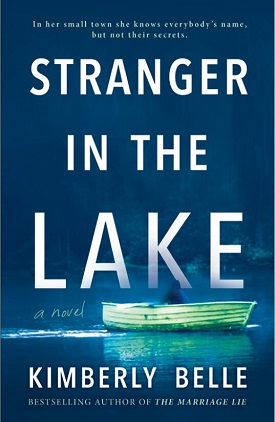 Synopsis:
Synopsis:
When Charlotte married older, wealthy widower Paul, it caused a ripple of gossip in their small lakeside town. Still, they’ve so far enjoyed a charmed life together, despite the cruel whispers about her trailer-park upbringing and the tragic, mysterious ending of his first marriage.
But everything begins to unravel when she discovers a young woman’s body floating in the exact same spot where Paul’s first wife drowned.
At first, her death seems like a horrific coincidence. But the stranger in the lake is no stranger. Charlotte encountered Paul talking to her the previous day, even though Paul tells the police he’s never met the woman. His lie exposes cracks in their fragile new marriage that Charlotte is determined to keep from breaking them in two.
As people and secrets from Paul’s past surface, Charlotte discovers mysteries that have been simmering under the lake’s waters for years. She doesn’t know who or what to trust — her heart, which tells her Paul is a good man, or her head, as evidence mounts that he’s desperate to keep secrets hidden.
Charlotte knows the names of everybody in the little town of Lake Crosby . . . but not their secrets.
Review:
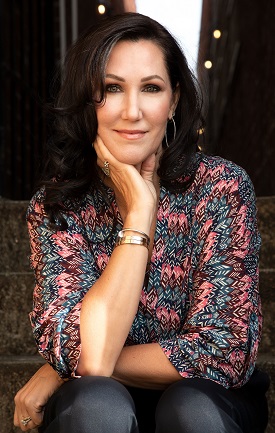
Kimberly Belle is the author of six novels, including The Ones We Trust, The Marriage Lie, and Dear Wife. Her latest, Stranger in the Lake, is an atmospheric mystery set in the picturesque little town of Lake Crosby, North Carolina, part of the Appalachian mountains. Belle says she has wanted to write a story set on a lake for a while. “There’s just something about a big body of water — the dark swirling currents, the beautiful but remote setting . . . It’s the perfect place to set a suspenseful story because you just know something bad is going to happen there.” Indeed, a lot of bad things happen in Lake Crosby, where mansions set on the lake stand in contrast to the other part of town in which Bell’s protagonist, Charlotte, and her younger brother, Chet, were raised by a neglectful, drug-addicted mother in a rundown trailer park. Belle observes that the polarity between the residents of such towns “makes for some very interesting dynamics, because when there’s money involved, when people have too much or their basic needs aren’t being met, morals can become questionable. This is something I really dug into for this story.”
Like so many other authors, including Harlan Coben and D.J. Palmer, the genesis of Belle’s novels is always a simple question: “What if . . .?” In the case of Stranger in the Lake Belle explores what happens when a woman marries a man whose wealth and social status greatly exceed her own. When he is suspected of murder, and evidence points to his guilt, what role does the wife’s “newfound wealth — and her fear of losing it — play in her decision to stick by him?”
As the story opens, Charlotte Keller has just discovered she is pregnant and is contemplating how to tell her husband, Paul, a successful architect eleven years her senior. She is confident Paul’s mother and other locals will be convinced that she cleverly planned the pregnancy in order to trap Paul and cement her place in his wealthy and powerful family. Charlotte and Paul have only been married a year or so, after having met when he patronized the convenience store where she worked. Many people in the little town still believe that Paul had something to do with the death of his first wife, Katherine, four years ago. They lived in the showplace home on the lake that Charlotte now shares with him. Katherine, a former competitive swimmer, drowned in the lake during a routine morning swim.
The morning after Charlotte goes to Paul’s office to pick him up and finds him chatting with a young woman she has never seen before, Charlotte discovers that woman’s body under the boat dock that fronts their lakeside home. It feels like “watching a horror movie, like seeing something forbidden and monstrous. Another faceless, lifeless woman bobbing in the reeds under our dock, only this time . . . Is it an accident? Or something worse? . . . Not here, under Paul’s dock. Not again.” The night before, Charlotte and Paul celebrated her pregnancy and when Charlotte work up a little after 6:00 a.m., Paul was already gone, presumably for his morning run. When Paul finally returns, Charlotte has alerted the authorities, including their next door neighbor, Micah, Paul’s lifelong friend and son of the police chief. Micah is a well-known diver who specializes in underwater investigations and evidence recovery. Charlotte is shocked when Paul denies ever having seen the deceased woman before. And from there, the mysteries within mysteries that Belle weaves into her tautly-constructed tale are revealed at an unrelenting pace.
Charlotte also saw Jax the previous day when she went to meet Paul. Jax, like Micah, is one of Paul’s oldest friends. But many years ago, he dropped out of society and began living deep in the woods. He is well-known to Lake Crosby residents, most of whom write him off as mentally disturbed. But he told Charlotte he needed to speak with Paul, who takes off into the woods to find him, leaving Charlotte alone and wondering why she endorsed Paul’s lie. Like him, she told the police she did not recognize the dead woman. Charlotte is unnerved by her own dishonesty and contemplates confessing the truth to Sam Kinkaid, the police officer who used to be her good friend. He warned Charlotte not to marry Paul. In fact, he stormed out of the wedding, telling Charlotte, “When you’re ready to hear the truth, you call me.” Charlotte wonders what Paul would do if she recanted. “Would he love me just the same? Lie or implicate your new husband and there goes the marriage, the money, the stability. And really, what’s one tiny, silly, inconsequential lie compared to everything Paul has given me? It’s not a difficult decision.”
Every person has a single defining moment. A moment that veers their life in a new direction, that changes them at a cellular level and makes them question everything they thought they knew, that colors every thought and decision afterward.
Charlotte loves Paul, believes that he loves her, and wants her marriage to survive. However, there are so many unanswered questions that she simply cannot ignore. Despite the way in which she grew up — largely responsible for raising Chet because her mother left them physically and emotionally alone — Charlotte has a strong sense of right and wrong, and now she has her own baby to consider and provide for. She loathes the idea of being a single mother, forced to support herself and her child working a dead-end job, living back on the other side of Lake Crosby’s literal and figurative tracks. But she cannot continue her life with Paul until she knows the truth, in part because she perceives that she might be in danger. She remembers the day not long ago when she married Paul. “My whole life stretched out before me that day. The life I wanted. The life I thought I deserved with a handsome husband, a pretty home, a bank account overflowing with case. If only I had looked more closely at the man behind the offer.”
Belle relates Charlotte’s internal struggle via a compelling first-person narrative detailing her doubts and the clues she follows in her quest for answers. Paul has not been entirely forthcoming with her about everything. In fact, he has lied to her about several things. Charlotte wonders, “What else has he lied about? What other secrets has he stuffed down, hidden in files on his hard drive or buried around the house like rotten Easter eggs? Happy couples don’t keep secrets, and they don’t lie. What does all this say about us, what does it mean for our future? For the future of the baby growing in my belly?” Could Paul have been lying all the times he insisted that he loved Katherine and did not harm her?
Belle injects a third-person narrative describing events that transpired in June 1999. Jax was mourning his mother, who died from ALS (Lou Gehrig’s disease), and trying to stay away from his once-happy home and family. His sister, Pamela, became obsessed with the healing power of prayer but, as predicted, it didn’t work and his mother’s life was not spared. Paul and Micah convince Jax that if they can’t find a party in town that night, they will make their own. But what really happened that evening? In subsequent flashbacks, Belle gradually reveals the whole story and why the three men remain bound to each other. Those revelations enable Belle’s readers to journey with Charlotte to the whole, shocking truth.
Along the way, Charlotte proves to be an empathetic and savvy character. Belle ramps up the tension until the secrets that Paul, Jax, and Micah have been keeping for more than two decades are revealed. But then Belle cleverly wrings even more intrigue out of her multi-layered and slyly nuanced thriller.
Stranger in the Lake is replete with characters whose lives are intricately and inextricably connected by secrets that, were is not for one random occurrence, would have remained buried forever. It’s a smartly-told, engrossing story featuring a protagonist who rises above the circumstances of her birth and childhood. At the outset, to the residents of Lake Crosby, she appears to have done so by marrying a rich man. But by the end of the story, Belle demonstrates that she has actually done so through her own integrity, ingenuity, resilience, and determination. Belle intended for her readers to cheer for Charlotte, explaining, “I love Charlotte because she is a survivor.” She has succeeded. Readers will be enthralled by Charlotte’s fearless quest for the truth, no matter the toll on her marriage, and her understanding that “your story beings and ends with you.”
Stranger in the Lake further cements Belle as a master storyteller who consistently delivers gripping, entertaining thrillers featuring strong female protagonists.
Excerpt from Stranger in the Lake
Chapter One
I untie the dock cleats and shove the boat into water as gray as the sky. Sometime in the past few hours, gunmetal clouds have rolled over the mountaintops, shooting down icy gusts that froth the surface of Lake Crosby into a million white peaks. My stomach churns, and not from the water’s chop.
Maybe morning sickness, maybe nerves at the words I need to say to my new husband out loud.
Surprise! I’m pregnant.
I sink onto the helm seat and shove my hands into the pockets of my new down jacket. A gift from Paul, who has impeccable taste—the kind that comes from good breeding and a big bank account. We’ve only ever spoken about children in the vaguest of terms. Things like “this room would make a good nursery” or “we would make pretty babies,” the “one day” silent but implied. He and his first wife never tried for a baby before she died, a little over four years ago. I haven’t known him a year. This wasn’t exactly the plan.
But neither was falling for a man eleven years older than me, a man who always claimed he’d never marry again. The thirty-seven-year-old wealthy widower falls for a gas station clerk from the muddy side of the mountain, both of us touched by tragedy. A combination that everybody from our town said would never work.
“I don’t give a damn what people think,” Paul is constantly telling me. “I love you and you love me, and that’s all that matters.”
But now… My hand feels under the jacket to my still flat stomach. What will he think about this little surprise blooming inside my belly? I have no idea.
His mother, the people in town, friends who’ve known him all his life. I know exactly what they’ll say.
They’ll say that this baby was no accident. That the littlest Keller will cement my place at the family dinner table in a way the three carats on my ring finger can’t. That marriages are temporary, but children are until the end of time. That now he’s really trapped.
Sugar daddy, sugar baby, baby daddy.
By now the wind has pushed me away from the dock, and I start the engine and swing the boat around. Paul and I live on a cove, but the currents here are swift, the water dangerously deep. The hill his house is perched on doesn’t stop at the shoreline, but plunges to depths of up to three hundred feet. There’s a whole town buried down there, tucked in the hills of what was once a thriving valley. Homes, roads, farms, schools. Graveyards. Whenever anything manages to wriggle loose—a battered shingle, an algae-covered shoe, a slimy dog collar—it ends up here, in Skeleton Cove.
Halfway to the town’s center, I ease up on the throttle going around the point to Buck Knob Cove and look westward, over the water and mountains and endless smoky skies. I’ve never lived anywhere else but Lake Crosby, North Carolina—have never even considered it—and still the raw beauty of this place can take my breath away. These mountains are as much a part of me as my own skin and bones, the connection as real as the cells multiplying in my belly. If I close my eyes, I can feel the plates shifting under my feet. I am the mountains and the mountains are me. I couldn’t live anyplace else if I tried.
It’s the one thing I can’t resent my mother for, I suppose, choosing this place to have a family—not that she was much of a parent. I mostly raised myself, and then I raised my brother Chet, which is how I know love can only go so far. Love doesn’t put food on the table. Love doesn’t pay the rent or the creditors who come banging at the door. A baby needs so much more than love.
People say I married Paul for the money, but that’s just not true. I married him because I love him, and I love him for all the things he provides. A mortgage-free roof over my head and a belly stuffed with nutritious, organic food. Health insurance and car insurance and cellphone and internet. The freedom of never having to choose between going cold or going hungry again. A life that is safe and stable and secure.
And really, when you think about it, isn’t security just another word for love?
Chapter Two
The town of Lake Crosby isn’t much, just three square blocks and some change, but it’s the only town in the southern Appalachians perched at the edge of the water, which makes it a popular tourist spot. Paul’s office is at the far end of the first block, tucked between a fudge shop and Stuart’s Craft Cocktails, which as far as I can tell is just another way to say pretentious bar. Most of the businesses here are pretentious, farm-to-table restaurants and specialty boutiques selling all things overpriced and unnecessary.
For people like Paul, town is a place to socialize and make money—in his case, by selling custom house designs for the million-dollar lots that sit high on the hills or line the lakeshores. My old friends serve his drinks and wait his tables—but only the lucky ones. There are ten times more locals than there are jobs.
The covered terrace for the cocktail lounge is quiet, a result of the off season and the incoming weather, the sign on the door still flipped to closed. I’m passing the empty hostess stand when I notice movement at the very back, a tattered shadow peeling away from the wall. Jax—the local town loon, the crazy old man who lives in the woods. Most people turn away from him, either out of pity or fear, but not me. For some reason I can’t put into words, I’ve never been afraid to look him straight on.
He takes a couple of halting steps, like he doesn’t want to be seen—and he probably doesn’t. Jax is like a deer you come up on in a meadow, one blink and he’s gone. But this time he doesn’t move.
His gaze flicks around, searching the street behind me. “Where’s Paul.” A statement, not a question.
Slowly, so not to spook him, I point to the sleek double doors on the next building, golden light spilling out the windows of Keller Architecture. “Did you check inside?”
Jax shakes his head. “I need to talk to him. It’s important.”
Like every time he emerges from out of the woods, curiosity bubbles in my chest. Once upon a time, Jax had everything going for him. High school prom king and star quarterback, the golden boy with a golden future, and one of Paul’s two best friends. Their picture still sits atop his desk in the study, Paul and Jax and Micah, all tanned chests and straightened smiles, three teenage boys with the world at their feet.
Now he’s Batty Jax, the raggedy, bearded boogeyman parents use as a warning. Do your homework, stay out of trouble, and don’t end up like Jax.
He clings to the murky back of the terrace, sticking to the shaded spots where it’s too dark for me to make out much more than a halo of matted hair, the jutting edges of an oversized jacket, long, lean thighs. His face is dark, too, the combination of a life outdoors and dirt.
“Do you want me to give Paul a message? Or if you stay right there, I can send him out. I know he’ll want to see you.”
Actually, I don’t know; I only assume. Jax is the source of a slew of rumors and petty gossip, but for Paul he’s a painful subject, one he doesn’t like to talk about. As far as I know, the two haven’t spoken since high school graduation—not an easy thing to do in a town where everybody knows everybody.
Jax glances up the street, in the direction of far-off voices floating on the icy wind. I don’t follow his gaze, but I can tell from the way his body turns skittish that someone is coming this way, moving closer.
“Do you need anything? Some money maybe?”
Good thing those people aren’t within earshot, because they would laugh at the absurdity of the trailer-park girl turned married-up wifey, offering the son of an insurance tycoon some cash. Not that Jax’s father didn’t disown him ages ago or that I have more than a couple bucks in my pocket, but still.
Jax shakes his head again. “Tell Paul I need to talk to him. Tell him to hurry.”
Before I can ask what for, he’s off, planting a palm on the railing and springing over in one easy leap, his body light as a pole vaulter. He hits the cement and takes off up the alley. I dash forward until I’m flush with the railing, peering down the long passage between Paul’s building and the cocktail lounge, but it’s empty. Jax is already gone.
I push through the doors of Keller Architecture, an open space with cleared desks and darkened computer screens. The white board on the back wall has already been wiped clean, too, one of the many tasks Paul requires his staff to do daily. It’s nearing five, and other than his lead designer, Gwen, hunched over a drawing at her drafting table, the office is empty.
She nods at my desk. “Perfect timing. I just finished the Curtis Cottage drawings.”
Calling a seven thousand square foot house a cottage is ridiculous, as are whatever reasons Tom Curtis and his wife, a couple well into their seventies, gave Paul for wanting six bedrooms and two kitchens in what is essentially a weekend home. But the Curtises are typical Keller Architecture clients—privileged, demanding, and more than a little entitled. They like Paul because he’s one of them. Having a desk is probably ridiculous, too, since I only work twenty hours a week, and for most of them I’m anywhere but here. My role is client relations, which consists mainly of hauling my ass to wherever the clients are so I can put out fires and talk them off the latest ledge. The job and the desk are one of the many perks of being married to a Keller.
“Thanks.” I tuck the Curtis designs under an arm and move towards the hallway to my left, a sleek tunnel of wood and steel that ends in Paul’s glass-walled office. “I’m here to pick up Paul. There’s something wrong with his car.”
When he called earlier to tell me his car was dead in the lot, I thought he was joking. Engine trouble is what happens to my ancient Civic, not Paul’s fancy Range Rover, a brand new supercharged machine with a dashboard that belongs in a cockpit. More money than sense, my mother would say about Paul if she were here, and now, I guess, about me.
Gwen leans back in her chair, wagging a mechanical pencil between two slim fingers. “Yeah, the dealer is sending a tow truck and a replacement car, but they just called to say they’re delayed. He said he had a couple of errands to run.”
I frown. “Who, the tow-truck driver?”
“No, Paul.” She swivels in her chair, reaching across the desk behind her for a straightedge. “He should be back any sec.”
I thank her and head for the door.
On the sidewalk, I fire off a quick text to Paul. I’m here, where are you?
I wait for a reply that doesn’t come. The screen goes dark, then black. I slip the phone into my jacket pocket and start walking.
In a town like Lake Crosby, there are only so many places Paul could be. The market, the pharmacy, the shop where he buys his ties and socks. I pop into all of them, but no one’s seen him since this morning. Back on the sidewalk, I pull out my phone and give him a call. It rings once, then shoots me to voicemail. I hit end and look up and down the mostly deserted street.
“Hey, Charlie,” somebody calls from across the road, two single lanes separated by a parking strip, and I whirl around, spotting Wade’s familiar face over the cars and SUVs. One of my brother’s former classmates, a known troublemaker who dropped out sophomore year because he was too busy cooking meth and raising hell. He leans against the ivory siding of the bed and breakfast, holding what I sincerely hope is a hand-rolled cigarette.
“It’s Charlotte,” I say, but I don’t know why I bother.
On my sixteenth birthday, I plunked down more than a hundred hard-earned dollars at the courthouse to change my name. But no matter how many times I correct the people who knew me back when—people who populate the trailer parks and shacks along the mountain range, people like Wade and me—no matter how many times I tell them I’m not that person anymore, to them I’ll always be Charlie.
He flicks the cigarette butt into the gutter and tilts his head up the street. “I just saw your old man coming out of the coffee shop.” Emphasis on the old man. “If you hurry, you can probably catch him.”
I mumble a thanks, then head in that direction.
Just past the market, I spot Paul at the far end of a side street, a paper cup clutched in his hand. He’s wearing the clothes I watched him pull on this morning—a North Face fleece, a navy cashmere sweater, dark jeans, leather lace-up boots, but no coat. No hat or scarf or gloves. Paul always dresses like this, without a second thought as to the elements. That fleece might be fine for the quick jogs from the house to his car to the office door, but with the wind skimming up the lake, he must be freezing.
The woman he’s talking to is more properly dressed. Boots and a black wool coat, the big buttons fastened all the way to a neck cloaked in a double-wrapped scarf. A knitted hat is pulled low over her ears and hair, leaving only a slice of her face—from this angle, her profile—exposed.
“There you are,” I say, and they both turn.
A short but awkward silence. If I didn’t know better, I’d think he looks surprised to see me.
“Charlotte, hi. I was just…” He glances at the woman, then back to me. “What are you doing here?”
“You asked me to pick you up. Didn’t you get my texts?”
With his free hand, he wriggles his cell from his pocket and checks the screen. “Oh. Sorry, I must have had it on silent. I was on my way back to the office, but then I got to talking and…well, you know how that goes.” He gives me a sheepish smile. It’s a known fact that Paul is a talker, and like in most small towns, there’s always someone to talk to.
But I don’t know this woman.
I take in her milky skin and sky-blue eyes, the light smattering of freckles across her nose and high cheekbones, and I’m positive I’ve never seen her before. She’s the kind of pretty a person would remember, almost beautiful even, though she’s nothing like his type. Paul likes his women curvy and exotic, with dark hair and ambiguous coloring. This woman is bony, her skin so pale it’s almost translucent.
I step closer, holding up my hand in a wave. “Hi, I’m Charlotte Keller. Paul’s wife.”
The woman gives me a polite smile, but her gaze flits to Paul. She murmurs something, and I’m pretty sure it’s “Keller.”
The hairs soldier on the back of my neck, even though I’ve never been the jealous type. It’s always seemed like such a waste of energy to me, being possessive and suspicious of a man who claims to love you. Either you believe him or you don’t—or so I’ve always thought. Paul tells me he loves me all the time, and I believe him.
But this woman wouldn’t be the first around these parts to try to snag herself a Keller.
“Are you ready?” I say, looking at Paul. “Because I came in the boat, and we need to get home before this weather blows in.”
The talk of rain does the trick, and Paul snaps out of whatever I walked into here. He gives me that smile he saves only for me, and a rush of something warm hits me hard, right behind the knees.
People who say Paul and I are wrong together don’t get that we’ve been waiting for each other all our lives. His first wife’s death, my convict father and meth-head mother, they broke us for a reason, so all these years later our jagged edges would fit together perfectly, like two pieces of the same, fractured puzzle. The first time Paul took my hand, the world just…started making sense.
And now there’s a baby, a perfect little piece of Paul and me, an accidental miracle that somehow busted through the birth control. Maybe it’s not a fluke but a sign, the universe’s way of telling me something good is coming. A new life. A new chance to get things right.
All of a sudden and out of nowhere I feel it, this burning in my chest, an overwhelming, desperate fire for this baby that’s taken root in my belly. I want it to grow and kick and thrive. I want it with everything inside me.
“Let’s go home.” Without so much as a backward glance at the woman, Paul takes my hand and leads me to the boat.

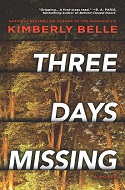
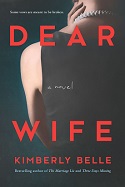
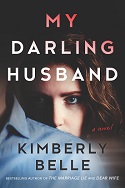





Comments are closed.